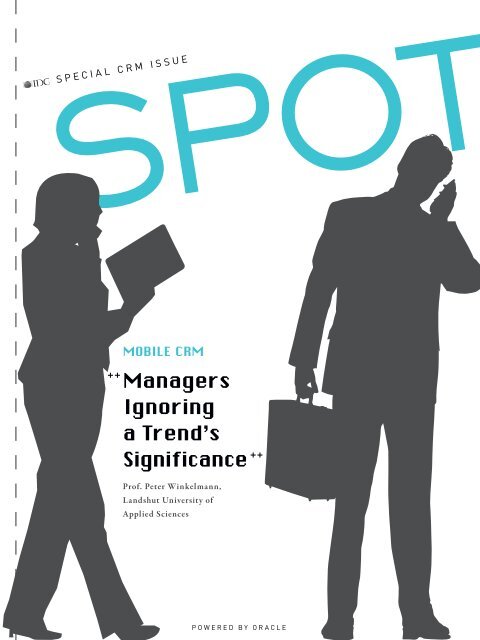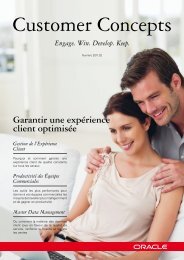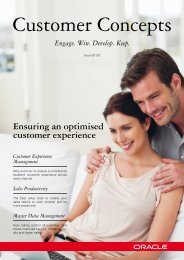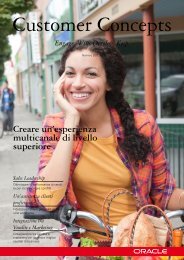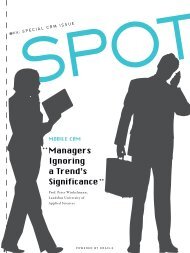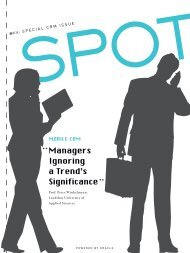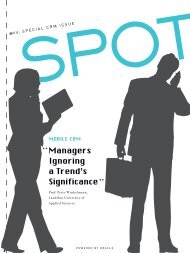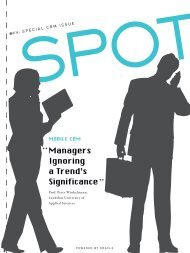test_IT
You also want an ePaper? Increase the reach of your titles
YUMPU automatically turns print PDFs into web optimized ePapers that Google loves.
Special cRM iSSue<br />
++<br />
poweRed by oRacle<br />
Mobile CRM<br />
Managers<br />
ignoring<br />
a Trend’s<br />
Significance ++<br />
Prof. Peter Winkelmann,<br />
Landshut University of<br />
Applied Sciences<br />
poweRed by oRacle
2 3<br />
mobile Customer management<br />
Keeping<br />
Information<br />
moving<br />
With CRM applied in social networks, companies are relying more<br />
and more on mobile CRM. Equipped with smartphones and tablet<br />
PCs, their sales representatives and service technicians are fanning<br />
out to give their customers faster and more flexible support.<br />
illustrations: cover, pages 2, 3, 5: © fotolia / dmitry Skvorcov<br />
by their very nature, sales and service at<br />
the customer’s location are mobile activities.<br />
and for customer relationship management<br />
(Crm), therein lie the challenges and the<br />
prospects. “regardless whether we’re referring<br />
to field staff, customer service reps, or<br />
managers, anyone dealing with customers on<br />
site should use the Crm system for ad hoc<br />
queries pertaining to customer-relevant information<br />
and be able to pass it on to the customer,”<br />
says ralf Korb, project manager of<br />
the Crm expo (a leading trade fair for this<br />
segment), identifying one of the challenges<br />
facing companies. Companies that rely on<br />
mobile Crm activate additional and as yet<br />
untapped productivity and motivation potential,<br />
claims Korb. “at the same time, employees<br />
working at the customer’s location become<br />
more effective and more informed. as a<br />
result, customers benefit from more overall<br />
expertise at any given time,” he adds, describing<br />
the strategic potential for companies.<br />
<strong>IT</strong> costs are a critical implementation<br />
factor<br />
even though Korb is seeing a very strong<br />
demand for information pertaining to mobile<br />
Crm on the market, according to a<br />
current study conducted by the landshut<br />
university of applied sciences, 42 percent of<br />
the surveyed companies are still not using any<br />
mobile end devices for their sales management.<br />
the implementation of mobile Crm<br />
systems is lagging especially among small<br />
and medium-sized enterprises (smes). Peter<br />
Winkelmann, a professor for sales and marketing<br />
at the landshut university of applied<br />
sciences and a co-author of the study, has a<br />
warning for these enterprises, saying, “if a<br />
company gets too far behind in terms of<br />
Crm, it will have difficulty catching up in<br />
the area of mobile Crm.”<br />
as a Crm expert, Korb anticipated this<br />
issue among smes, but believes dealing with<br />
it is a budget-related matter. in addition to<br />
the procurement costs for mobile end devices,<br />
the required it expertise is a decisive cost<br />
factor. besides configuring smartphones and<br />
other such accessories, the it departments<br />
must also ensure data security and provide<br />
user support – and these are areas that “mobile”<br />
strategies must first clear up and take<br />
into account. they also include<br />
the question as to whether one<br />
should choose a browser-based<br />
or “native,” operating systemdependent<br />
solution.<br />
Almost all CRM<br />
providers offer a<br />
mobile solution<br />
a browser-based application<br />
has the advantage that the<br />
Crm version, much like<br />
on-demand software, will<br />
always be kept up-to-date,<br />
thereby decreasing the support<br />
costs. in a native solution,<br />
such as for iPhones or<br />
blackberrys, it would have to<br />
be distributed over all end<br />
devices and kept updated<br />
accordingly. Korb believes<br />
that over the long term the
4 5<br />
browser-based approach is going to catch on.<br />
“the ease of operation is somewhat limited,<br />
but it works on every device,” he says.<br />
in the meantime, Korb thinks it’s a must<br />
for Crm providers to offer at least one solution<br />
for mobile end devices. except for a few<br />
small suppliers, almost all manufacturers also<br />
provide a corresponding application whose<br />
slimmed-down functionalities keep the<br />
information flowing between sales / service<br />
employees and the company. one of the three<br />
biggest Crm providers is a pioneer. “since<br />
2001 – 2002, oracle has been active in this<br />
field and thus has the most experience with<br />
enterprise-related solutions in the mobile<br />
realm,” says Korb. based on their own individual<br />
analyses of user behavior, each company<br />
needs to decide what functions and<br />
inputs are offered.<br />
there are currently five operating systems<br />
on the market: symbian, android, Windows<br />
mobile, apples ios and blackberry by<br />
research in motion (rim). as a result, all<br />
software manufacturers are trying to figure<br />
out how they can best meet the market’s needs.<br />
“they orient themselves to the market distribution<br />
of the end devices,” says Korb. according<br />
to gartner, android posted the highest<br />
growth in end devices. Compared to 2009,<br />
the operating system grew by 888.8 percent<br />
worldwide by 2010, earning the number two<br />
position in the worldwide smartphone market.<br />
nokia’s symbian was able to increase the<br />
total number of its end devices and hold on<br />
to first place, but it did lose almost a 10-<br />
percent market share. rim gave up market<br />
share, too, and slid down to third place despite<br />
selling 38.2 percent more smartphones.<br />
the winners include apple’s ios that with<br />
an 87.2-percent growth in end devices grew<br />
faster than rim and now almost has the<br />
same market share.<br />
Attractive end devices increase<br />
CRM’s acceptance<br />
based on a Cisco study, mobile data traffic<br />
is expected to increase 30-fold by 2015 compared<br />
to 2010 – a growth of 97 percent annually.<br />
tablets in particular are responsible<br />
for the tremendous expansion. according<br />
to Cisco, the number of mobile PCs will<br />
increase by a factor of 32 to 5.1 million in four<br />
years, while smartphones and notebooks can<br />
expect a more moderate increase by a factor<br />
of three or four. this is an assessment that<br />
Dieter greipl, co-author of the landshut university<br />
study, shares in regard to usage in the<br />
business sector, saying, “tablets are going<br />
to give other devices a run for their money!”<br />
the activity among almost all end device<br />
manufacturers underscores this trend. this<br />
spring, rim introduced the mediatablet<br />
Playbook, while acer’s slider, samsung’s<br />
galaxy tab, and motorola’s Zoom gave the<br />
iPad some competition. advantages over the<br />
smartphones include bigger screens that make<br />
it easier for two people to see, and greater<br />
computing power for complex applications.<br />
Korb mentions another factor, “in some<br />
industries, the age of the sellers plays a role.<br />
especially employees over 50 years old can be<br />
motivated to use mobile Crm systems via a<br />
corresponding end device like the iPad.” an<br />
attractive end device also increases a Crm<br />
system’s appeal overall. elke Senger-wiechers<br />
The most import mobile CRM functionalities<br />
Route planning GpS<br />
appointment calendar<br />
Manage contacts<br />
external / internal news<br />
Manage corporate customers<br />
Manage tasks<br />
Manage visit reports<br />
Monitor sales results<br />
Manage top bids<br />
Manage complaints<br />
Result from customer forums: 54 companies; Source: landshut univ., 2011 1 not relevant<br />
2 unimportant 3 not really important 4 somewhat important 5 very important 6 extremely important<br />
in the “significance” assessment, the more administrative<br />
functions of traditional sales management prevail. The question<br />
of how quickly mobile cRM will catch on will also depend on<br />
the extent to which functionalities are developed for process<br />
management, planning and controlling. Here, the respondents<br />
rated the significance as only moderate.<br />
prof. peter winkelmann, co-author of the study,<br />
landshut university of applied Sciences<br />
Comparison of native and web-based applications<br />
Native Apps Web-based Apps<br />
Access an app required for each<br />
operating system<br />
Security data on the end device,<br />
synchronization required<br />
Interfaces Fully utilize the device-specific<br />
functions (camera, GpS,<br />
microphone, etc.)<br />
Usability /<br />
User-Experience<br />
adapted to the respective device<br />
and operating system<br />
Support costs High (installation for each end<br />
device; update monitoring required)<br />
3.5<br />
3.5<br />
3.8<br />
3.9<br />
4.7<br />
4.8<br />
5.0<br />
5.2<br />
5.3<br />
Via the browser, thereby<br />
independent of operating system<br />
No data on the end device,<br />
data stored in the cloud<br />
Few device-specific functions<br />
possible<br />
Generally limited to display<br />
possibilities in the browser<br />
low (no installation required;<br />
periodic, automatic updates)<br />
6.0
6 7<br />
Crm at stryKer euroPe<br />
Sales Force<br />
on the road<br />
with CRM<br />
illustration: © iStockphoto / studioaraminta<br />
As one of the leaders in medical technology market,<br />
Stryker Europe sees CRM as a strategic solution that enables<br />
the Sales force efficiency processes.<br />
When Firas almahamid looks out of his<br />
office window, he can see a narrow blanket of<br />
spring green grass surrounded by magnificent<br />
houses in the city of montreux. to one side,<br />
a magnolia tree gently pushes fresh shoots<br />
holding fist-sized buds toward the sun.<br />
it’s hard to believe we are on the second floor<br />
of a modern office block constructed of glass<br />
and steel. opposite almahamid’s office, at<br />
the other end of the corridor, a glass facade<br />
offers a panoramic view across the surface<br />
of lake leman.<br />
last year, michigan-based stryker Corporation<br />
recorded annual revenues of 5.2 billion<br />
euros in 89 countries around the world.<br />
35 percent of this was generated in countries<br />
outside the us, europe, is stryker’s secondlargest<br />
market after the united states.<br />
This specialist company’s portfolio includes<br />
orthopaedic and medical technology products,<br />
such as artificial joints, spinal implants,<br />
emergency cots, and or equipment. stryker<br />
employs around 20,000 people worldwide.<br />
The most recent Crm project was launched<br />
in march 2010.<br />
“management had already identified the<br />
need for a customer relationship management<br />
solution at that point,” explains Firas<br />
almahamid, senior Director global enter-<br />
prise systems. “We urgently needed to offer<br />
it support to the ongoing sales Force excellence<br />
initiative.”<br />
management at stryker opted for an on-<br />
demand solution to ensure that the new<br />
Crm system would be available as quickly as<br />
Stryker Europe´s CRM strategy<br />
Stryker’s Firas Almahamid, Senior Director<br />
Global Enterprise Systems and responsible<br />
for CRM opted for oracle’s cRM on<br />
demand. The sales force will soon be using<br />
tablets to access the medical com pany’s<br />
cRM systems, which will let them run the<br />
sales processes in an efficient way while<br />
on the go.
8<br />
possible. after a market analysis comparing<br />
various products and providers, the final preference<br />
was for oracle’s siebel software.<br />
“according to our analyses, oracle’s siebel<br />
Crm solution is the best fit for all our requirements<br />
as defined by our cross functional<br />
project team,” almahamid adds. “This product<br />
has a proven track record in other companies<br />
in the medical technology sector, could<br />
be integrated into our back-end systems, and<br />
seemed to us to be incredibly user-friendly.”<br />
The designs of the application started early<br />
July 2010, and a pilot project with 15 users<br />
went live in France in november. The pilot<br />
confirmed the initial project plan and led<br />
to a rollout across France, which ended in<br />
late march 2011 and gave almost one hundred<br />
users in sales access to decision-relevant<br />
data and analyses via the customer management<br />
system. What’s more, all this is avai-<br />
lable via a single user interface and a single<br />
mobile device thanks to full and complete<br />
integration of the Crm solution into reporting<br />
at stryker France.<br />
No longer any acceptance<br />
problems<br />
From the start, the Crm project focused on<br />
the ease of use of the system. The fact that<br />
stryker sales reps travel extensively should<br />
not stop them being able to use the full range<br />
of key data in real time. “The ability to use<br />
the Crm system on the road was a priority<br />
for us,” says almahamid. “in some past<br />
Crm projects the acceptance for these<br />
applications was low with our field service<br />
reps because there were some limitations<br />
compared to the desktop application. so in<br />
this current project we are focusing on<br />
usability of the mobile application.”<br />
it was not all plain sailing for almahamid<br />
and his project team as they tried to implement<br />
Crm. not all Crm on demand<br />
functionality designed and available for<br />
some specific smartphones. almahamid<br />
clarifies: “The only things you could do<br />
with the smart phones was to make calls and<br />
read data. you couldn’t input data, which was<br />
not acceptable for us.”<br />
stryker took appropriate action and resolved<br />
to continue using blackberrys as a<br />
means of communication. They decided to<br />
deploy a high-end device for using the Crm<br />
software and exchanging data, and eventually<br />
settled on apple’s iPad. “by giving them<br />
iPads, we’ve made sure that our sales team<br />
have high-performance devices that cover all<br />
the mobile functions they need, which guarantees<br />
immediate acceptance,” says almahamid.<br />
“These tablets also allow us to show<br />
clients high-end presentations for stryker<br />
products, reinforcing our company’s image<br />
as an innovator”.<br />
once the Crm solution has been rolled<br />
out to all local offices across europe by the<br />
end of 2011, the members of the sales team<br />
can access and use the Crm via their iPad.<br />
“This will give our team a more comprehensive<br />
overview of their field of activity and help<br />
them work more efficiently,” says almahamid<br />
looking ahead to when the pro-ject ends. “The<br />
new sales efficiency processes enabled by<br />
the Crm solution will make us more<br />
competitive and puts us in a position to gain<br />
additional market share.” ima buxton<br />
SpoT, a cRM magazine –<br />
now also an iPad app<br />
New issue due out in early May<br />
a production of Strategic marketing Services, idG business Media GmbH, Munich
10 11<br />
Outdoor CRM<br />
“A lot of managers aren’t<br />
doing their job.”<br />
Even though many companies are benefitting from improved customer-<br />
and cost-focused sales processes, 50 percent of the companies<br />
still have not recognized the benefits of mobile CRM, according to<br />
the initial findings of a study conducted by the Landshut University of<br />
Applied Sciences.<br />
Why are so few companies using mobile CRM?<br />
peter winkelmann: Managers in Germany are<br />
repeating the mistake they’ve made once be-<br />
fore when the topic of cRM came up. They are<br />
ignoring the significance of a trend. Many sales<br />
managers and managing directors aren’t doing<br />
their job and not getting enough information<br />
from modern sales management tools. in a re-<br />
cent study, we asked 54 companies how impor-<br />
tant mobile cRM was for them. The preliminary<br />
results are unsettling: 17 percent believe that<br />
mobile cRM is unimportant, and 25 percent<br />
have no opinion yet. in other words, 42 percent<br />
aren’t assigning it the importance we think it<br />
should have. another finding was that slightly<br />
more than half of them had not instituted any<br />
initiatives.<br />
You claim that management should place<br />
greater significance on the topic. Why?<br />
peter winkelmann: Mobile cRM has a highly<br />
positive effect when it comes to focusing on<br />
customers and internal costs. all customer<br />
support tasks can be handled around the clock<br />
every day from any place on earth – a bona fide<br />
outdoor cRM system. Flexibility at the customer’s<br />
location increases tremendously. That results<br />
in a significant improvement in contact expertise<br />
– whereby personal and business realms<br />
can merge and grow. However, the really big deal<br />
pertains to how the efficiency of internal processes<br />
can be improved, which is confirmed by the<br />
preliminary results of our study: 75.9 percent<br />
of the 194 target figures pertain to faster processes,<br />
57.4 percent to greater transparency,<br />
and 48.1 percent to improved team selling.<br />
Mobile cRM should also catch on among customers<br />
given that 51.9 percent of the respondents<br />
seek more customized customer support.<br />
Does CRM have any risks?<br />
peter winkelmann: There could be a loss of<br />
personal mindfulness. when the devices are<br />
lying on a table and everyone is playing with<br />
them, there could be a lack of focus on a given<br />
problem. but that’s something people will just<br />
have to work on.<br />
dieter Greipl: Naturally, security plays a major<br />
role, too. From a technical perspective, the<br />
problem is solved through corresponding encryption<br />
technologies. but another question is<br />
how mobile end device users handle the data<br />
and devices. To that end, companies have to be<br />
able to monitor that a smartphone goes into<br />
auto-lock mode after two minutes and that it’s<br />
not turned off by employees because it’s bothersome.<br />
we’re seeing a little-known skill evolving<br />
here, which is device management.<br />
Here’s a big question. Can users utilize<br />
their own devices?<br />
dieter Greipl: There is the risk that in using<br />
personal devices, iT could lose a lot of control.<br />
it starts with simple things like employees<br />
wanting to access their e-mails. if a company<br />
isn’t careful, there could be an uncontrolled<br />
proliferation that is then very difficult to rein in.<br />
The authors of the CRM study:<br />
Prof. Peter Winkelmann (at right) teaches marketing and sales at<br />
landshut university and is head of the Master’s program in marketoriented<br />
business management. winkelmann is considered one of<br />
Germany’s foremost experts in cRM and sales management.<br />
Prof. Dieter Greipl (at left) teaches business information technology<br />
(biT) at landshut university. His area of emphasis is on business<br />
software and mobile systems; he is also head of the biT program.<br />
This also applies to the devices. our study shows<br />
that users want to be free to choose their<br />
mobile end devices. For support staff however,<br />
it is simpler and more cost-effective to specify<br />
the use of certain standardized devices. every<br />
type of device requires additional iT expertise<br />
that, depending on the applications used,<br />
costs extra.<br />
What do users prefer: smartphones<br />
or tablet PCs?<br />
dieter Greipl: we asked whether smartphones<br />
are perceived as replacements for notebooks.<br />
Two-thirds said no, while about one third want<br />
to have notebooks when visiting customers.<br />
even if the answers are not evenly balanced,<br />
this split in opinion is an indicator that business<br />
tablets will catch on. The 33-percent group that<br />
wants to keep their notebooks has built up a<br />
noticeable resistance to smartphones. These<br />
respondents believe that smartphones are not<br />
fast enough and cannot replace all notebook<br />
functions. However, i think that this segment<br />
will be working with tablets in the future.<br />
Questions asked by elke Senger-wiechers<br />
MASTHEAD Publisher: oRacle deutschland b. V. & co. KG., Riesstr. 25, 80992 Munich; Publishing company: idG business Media GmbH, lyonel-Feininger-Str. 26,<br />
80807 Munich; CEO: york von Heimburg; Publishing director: Michael beilfuss; Head of advertising: Sebastian wörle, +49 89 36086-115; Head of Strategic<br />
Marketing Services (SMS): Karl-Heinz piotrowiski; Editors: Katharina Friedmann, andreas Schmitz (responsible according to German press laws); Project<br />
management: Stephan Hoppe; Contributors: ima buxton, Renate oettinger, Michael Klinksik, elke Senger-wiechers; Layout: Rika beisenherz.


